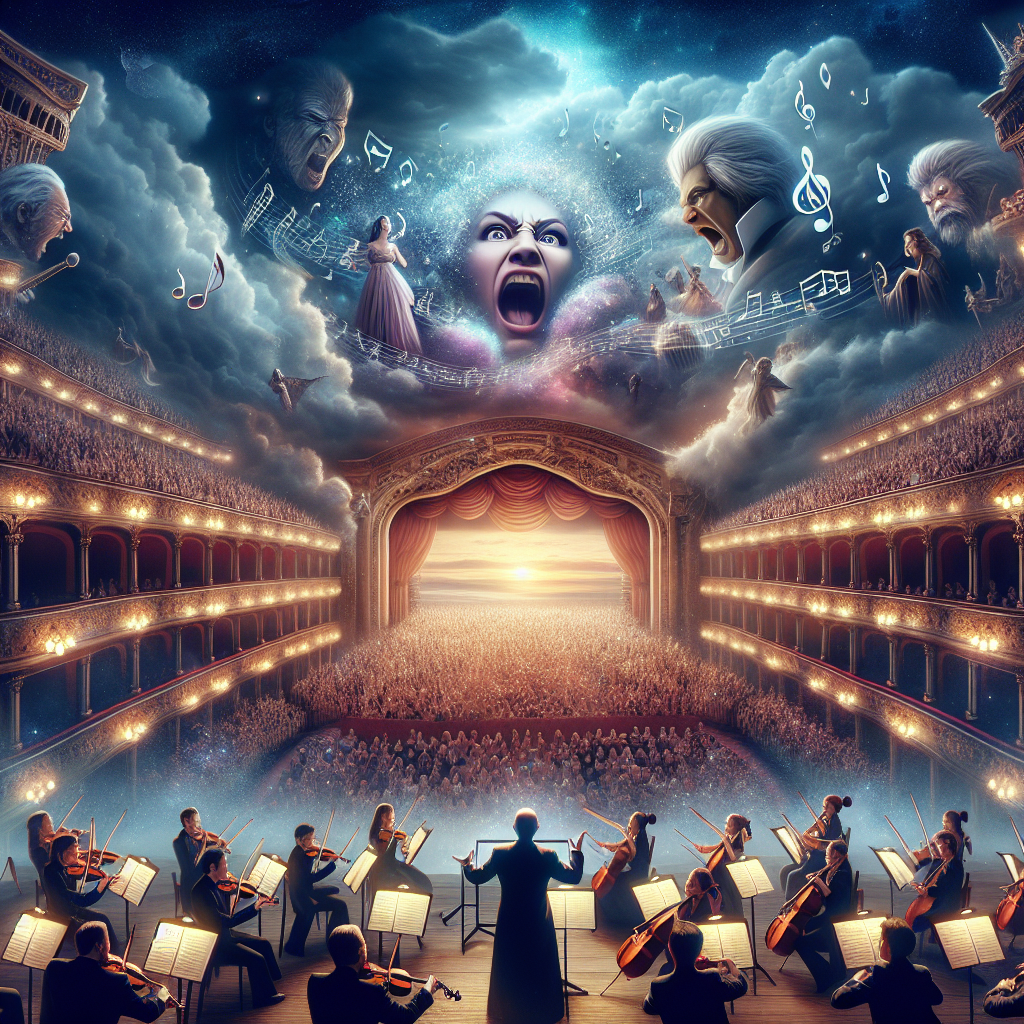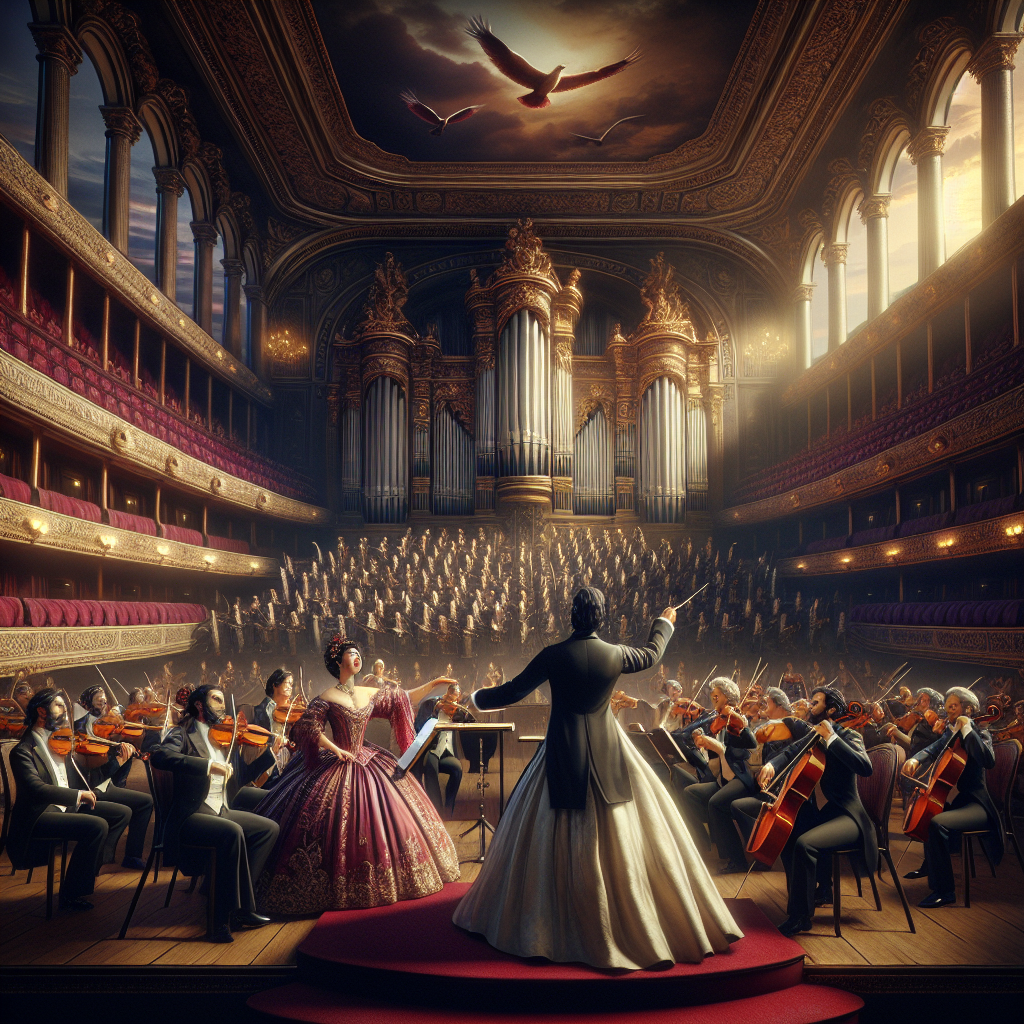
The Dramatic World of Beethoven’s Operatic Arias
In the vast world of classical music, few names resonate as powerfully as that of Ludwig van Beethoven. Known for his symphonies, sonatas, and string quartets, Beethoven’s vocal and choral work sits in a fascinating niche of its own. While his instrumental compositions are celebrated for their emotional depth and innovative structures, Beethoven’s vocal works—especially his operatic arias—hold a dramatic potency that is often overshadowed by his more famous compositions. Exploring Beethoven’s foray into operatic music offers a glimpse into his unique approach to vocal composition and storytelling.
Beethoven lived during a time when opera was a dominant force in the music world. Audiences were captivated by the dramatic narratives, expressive music, and the spectacle of operatic performances. Despite the popularity of opera, Beethoven composed only one opera, “Fidelio.” However, through “Fidelio” and other vocal works, Beethoven demonstrated his capability to weave powerful drama into music, creating arias that stand out not only for their technical brilliance but also for their emotional and narrative depth.
To understand Beethoven’s contribution to the world of vocal music, it is essential to explore the context in which he worked. His operatic ventures were heavily influenced by the spirit of the Enlightenment and the political upheavals of his time. The themes of heroism, justice, and human struggle prevalent in his music mirrored the societal changes and personal challenges he faced. Beethoven’s arias are more than just beautiful melodies; they are reflections of his ideals and his quest to capture the human spirit through music.
In this article, we will delve into the dramatic world of Beethoven’s operatic arias, examining their historical context, compositional style, and the brilliance with which Beethoven infused his vocal works with evocative drama and emotional depth. Through this exploration, we will unravel the complexities and the genius of Beethoven as a composer of vocal music.
Beethoven and the Birth of “Fidelio”
Beethoven’s solitary opera, “Fidelio,” stands as a testament to his enduring creativity and determination. The journey to its creation was fraught with challenges both personal and professional. Initially conceived as “Leonore,” the opera underwent an arduous development process marked by revisions, premieres, and critical feedback.
“Fidelio” was inspired by a real-life story of heroism and justice. Beethoven infused the opera with his ideals of freedom, equality, and justice—concepts that were at the forefront of his mind during an era where autocracy was being challenged by revolutionary thought. This thematic depth gives “Fidelio” an emotional and intellectual weight that resonates with audiences to this day.
The creation of “Fidelio” took many years, with Beethoven revising it several times before its final version was completed in 1814. Despite initial lukewarm receptions, the opera eventually garnered success, particularly due to its powerful arias. These arias highlight the dramatic situations faced by the characters and are notable for their complexity and vocal demands.
One significant aspect of “Fidelio” is its ability to encapsulate a wide range of emotions through music. Beethoven’s arias in the opera convey the drama and intensity of each scene. Characters express everything from despair and longing to hope and triumph. This dynamic range demonstrates Beethoven’s gift for blending narrative and emotion into his musical compositions, providing singers with an opportunity to explore deep emotional dimensions in their performances.

Analyzing Beethoven’s Aria Composition Style
Beethoven’s approach to composing operatic arias was distinct and reflective of his larger musical style. Known for pushing the boundaries of traditional structures, Beethoven often incorporated unexpected shifts in tonality and dynamics within his arias, creating a sense of heightened drama.
Consider Florestan’s aria from “Fidelio,” where Beethoven’s use of stark contrasts and sudden dynamic changes give voice to the character’s despair and flickers of hope in a dark prison cell. The aria’s orchestration complements these emotional shifts, blending seamlessly with the vocal line to maximize dramatic impact. Beethoven effectively used orchestration as an extension of the vocal narrative, reinforcing the emotions conveyed by the singers.
Another hallmark of Beethoven’s style is his emphasis on vocal range and expressivity. Unlike many of his contemporaries, Beethoven didn’t write music that solely highlighted vocal virtuosity. Instead, he focused on capturing the essence of his characters through music. This is evident in the expressive melodies and thoughtful phrasing found throughout his operatic and vocal works.
The intricate attention to the textual content of his arias further showcases Beethoven’s mastery. His compositions are closely aligned with the librettos, ensuring that each word and phrase resonates with its corresponding musical motif. This integration enhances the dramatic storytelling, allowing the audience to connect more deeply with the unfolding narrative.
The Role of Chorus in Beethoven’s Operas
The choral elements in Beethoven’s operas serve a critical role, extending beyond mere background accompaniment to become integral narrative components. Beethoven was mindful of the chorus, using it to enhance the operatic experience by reinforcing dramatic intensity and contributing to the unfolding story.
In “Fidelio,” the chorus forms an essential part of the musical landscape, representing collective sentiments and societal pressures. For instance, at the opera’s climax, the chorus becomes a voice for liberation and enlightenment, capturing the essence of the story’s victory over tyranny.
This multifaceted use of choir highlights Beethoven’s appreciation of choral music’s power to unify musical themes and direct audience focus. He often employed the chorus to juxtapose individual emotions against larger, collective experiences, thereby broadening the scope of storytelling within his operas.
The effectiveness of Beethoven’s choral work also lies in its intricate harmonies and phrasing, which create an atmospheric environment that is emotionally compelling for audience members. He matches choral texture with orchestral richness, crafting an aural experience that bolsters the operatic action.
Beethoven’s Impact on Future Opera and Choral Composers
Beethoven’s operatic and vocal achievements reverberated through generations, influencing composers well beyond his time. His ability to interlace profound emotion with thoughtful librettos set a benchmark for what could be achieved within the operatic genre.
The innovations found in Beethoven’s vocal music challenged other composers to experiment more freely with structure and expression, fostering development within the Romantic era. Composers like Wagner adopted and expanded on Beethoven’s narrative techniques, particularly his use of leitmotifs and symphonic cohesion.
Beethoven’s legacy also influenced choral composition. His “Missa Solemnis” and “Choral Fantasy” showcase his innovative approach to melding vocal and instrumental forms, providing a blueprint for future explorations in unified choral-orchestral works. This impact extended to composers like Brahms and Mahler, who drew inspiration from Beethoven’s integration of chorus within symphonic settings.
In summary, Beethoven’s work in opera and choral genres left an indelible mark on music history. His innovations in vocal composition continue to resonate with musicians and audiences today, underscoring his role as a transformational figure in the evolution of classical music.
The Performance Legacy of Beethoven’s Vocal Works
Performing Beethoven’s operatic arias and choral works presents unique challenges and rewards for vocalists and conductors alike. The intricate musical textures and diverse emotional demands require musicians to balance technical prowess with interpretative depth.
Singers navigating Beethoven’s arias must do so with careful attention to their emotional delivery. His music demands clarity in both voice and narrative expression, encouraging performers to delve into the character’s psyche. The ability to convey intense emotions like anguish, courage, or elation while maintaining vocal finesse is key to successful performances.
For conductors, conducting Beethoven’s vocal works involves orchestrating a finely-tuned balance between soloist, chorus, and orchestra. Conductors must inspire cohesion and dynamic clarity, ensuring that each musical component enhances the operatic drama. The evocative power of Beethoven’s music lies in the harmony between these elements, which performers strive to bring to life on stage.
Beethoven’s vocal and choral works continue to be integral to repertoires across the world. Their performance not only showcases the technical and artistic capacities of musicians but also reinforces Beethoven’s enduring influence. The timeless nature of these works speaks to their ability to resonate with each new generation of both artists and listeners.
Conclusion: The Timeless Relevance of Beethoven’s Vocal Works
Despite a lifetime marked by personal hardship and profound artistic ambition, Ludwig van Beethoven’s contributions to vocal and choral music remain as enlightening today as they were transformative in his time. His operatic arias, particularly in “Fidelio,” stand as some of the most compelling musical expressions of the human experience, articulating themes of heroism, love, and freedom.
The innovative approaches and techniques Beethoven employed in his vocal compositions helped set a new framework for how music interacts with narrative, emotion, and thought. His distinctive contributions have reverberated through generations, effecting profound changes within operatic and choral forms.
Performing Beethoven’s works gives artists an opportunity to explore and communicate deep emotional and intellectual vibrancy, allowing audiences to experience the sheer scope of his genius. Each performance becomes a testament to Beethoven’s timeless appeal and his influence on the fabric of classical music.
Ultimately, Beethoven’s operatic and choral music transcends mere artistic achievement. They represent a lifelong commitment to exploring humanity’s complex and rich emotional depth through music. As such, they hold a revered place within the canon of Western music, continually offering fresh insights and emotional connections. They are a reflection of Beethoven’s indomitable spirit and unwavering pursuit of musical truth—one that encourages all who engage with his works to remember the transformative power of music.